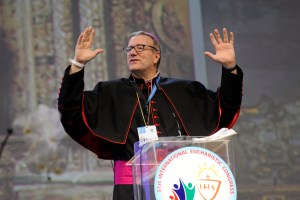“Though they use the same word ‘God,’ they really have no idea what Aquinas means when he uses the word ‘God.’”
 Who is God? Much of theology at Fenwick revolves around this question. Who is the God of Abraham, the God of Moses, the God-man Jesus? What does it mean to interact with this God? They are big questions, and the answers have significant impact on our lives of faith. It makes a big difference if we think that:
Who is God? Much of theology at Fenwick revolves around this question. Who is the God of Abraham, the God of Moses, the God-man Jesus? What does it mean to interact with this God? They are big questions, and the answers have significant impact on our lives of faith. It makes a big difference if we think that:
- A) God tested Abraham with the sacrifice of Isaac just to see if he will do literally anything God asks no matter the cost, or
- B) God tested Abraham to develop Abraham’s confidence in the true goodness of God who will honor his promises (descendants through Isaac) even when it seems completely contradictory to present experience.
Is God demanding beyond our comprehension, or good when it seems impossible? Is faith about blind obedience or profound trust in goodness? Personally, I find hope in the latter and not the former. Most times I read the news I need to be reminded that God truly is good though it just doesn’t seem to be the case in the world.
Christians need to wrestle with these kind of questions both for our relationship with God and our proclamation of Christ. Who is this God we stake our lives on? Who is this God that promises to save us?
However, there is perhaps a more fundamental question for today’s world: Who ISN’T God? What is God not? These are essential questions for a scientific age that dismisses God as superstitious explanation for inexplicable realities by our inferior ancestors. Is God really just our answer for what we don’t understood? Aquinas’ proofs are actually the opposite: God is the explanation behind what we do understand. God is the grounding of science beyond science itself. He is the logos — the very meaning of all existence and truth.
 This topic pervades the videos of Bishop Barron. Many conflicts over science and religion come from people using totally different definitions of God. He astutely points out that the God rejected by Christopher Hitchins and Richard Dawkins is also rejected by Aquinas and the wealth of Catholic history. We simply don’t mean the same thing when we talk about God.
This topic pervades the videos of Bishop Barron. Many conflicts over science and religion come from people using totally different definitions of God. He astutely points out that the God rejected by Christopher Hitchins and Richard Dawkins is also rejected by Aquinas and the wealth of Catholic history. We simply don’t mean the same thing when we talk about God.
Click here to view one video where Barron jumps straight into the issue.
As the season of Lent is kicking off, one spiritual purification to consider is not a moral one, but a theological one. Watch some videos by Barron or other Catholic theologians to get rid of the “Golden Calves” we build up. They aren’t just money and power but misunderstandings of the Way, the Truth and the Life. Ponder again what God we don’t believe in, and look again to the Cross and Resurrection of Christ to see exactly what God we cling to in faith.
 This is the third post in our series of reflections on the work of Bishop Robert Barron, upcoming recipient of the Lumen Tranquillum (“Quiet Light”) Award. You can find the first and second posts here:
This is the third post in our series of reflections on the work of Bishop Robert Barron, upcoming recipient of the Lumen Tranquillum (“Quiet Light”) Award. You can find the first and second posts here:
- “The Only Way Up Is Down”
- “Death to Self: Bishop Barron’s Calling Began at Fenwick”
- You also may enjoy reading “The Myth of Science vs. Religion” by Fenwick President Fr. Richard Peddicord, O.P.
Continue reading “Who Is God? Perhaps More Importantly, Who Isn’t He?”



 That is why advent is a season of hope — hope for the coming of perfect mercy and justice. It’s a gritty virtue for people in need, not the fluffy one often imagined. It’s the virtue of being on a journey towards God and trusting goodness really will reign one day. It’s for those who don’t have everything they want and know they need something more. We need Christ, the light who shines in the darkness. We also need to ponder the darkness if we want to appreciate the light.
That is why advent is a season of hope — hope for the coming of perfect mercy and justice. It’s a gritty virtue for people in need, not the fluffy one often imagined. It’s the virtue of being on a journey towards God and trusting goodness really will reign one day. It’s for those who don’t have everything they want and know they need something more. We need Christ, the light who shines in the darkness. We also need to ponder the darkness if we want to appreciate the light.